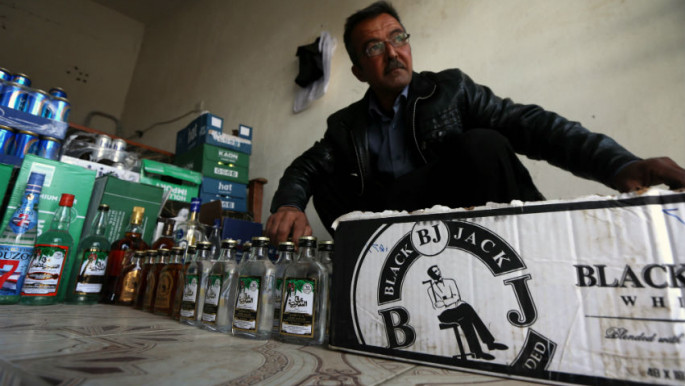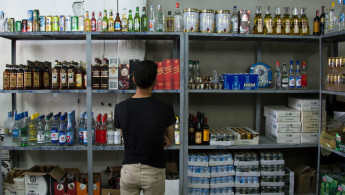Battle of the bottle: Iraq's love-hate relationship with booze
Two examples, albeit anecdotal, from Iraqi history aptly illustrate the erratic nature of the tipple's trials and tribulations.
One was a frequent booze-related problem which afflicted Iraq's southern province of Basra in the late 1970s. As journalist Patrick Cockburn once recalled, the beer in the city was completely consumed on a regular occasion by Kuwaitis crossing over the border on weekends to enjoy drinks they couldn't get in their own country.
The other occurred during the March 1991 Shia uprising against the Saddam Hussein regime in the same province. One of the first things the Iranian-backed Badr Brigade (now known as the Badr Organization) did when they arrived from Iran to fight Saddam was to burn down the Basra International Hotel - then known as the Sheraton Hotel - along with the city's bars and casinos.
They declared the establishment of an "Islamic Republic in Basra" - that was swiftly crushed, along with the much broader revolt - shortly thereafter.
 |
When he was vice-president in the late 1970s, Saddam Hussein once greeted British journalists in Baghdad by offering them 'an Iraqi national drink', only to then serve them Johnny Walker Black Label |  |
While a conservative country (especially following the 1991 Gulf War and the subsequent crippling sanctions), Iraq as a society hasn't even begun to resemble that of neighbouring Iran, also a Shia-majority country, where alcohol has been completely outlawed since the 1979 Islamic Revolution. Possession or sale of a bottle of booze can result in harsh punishment.
Iraqis, on the other hand, still enjoy their national drink, araq, which is also popular among Syrians, Lebanese and Palestinians.
When he was vice-president in the late 1970s, Saddam Hussein once greeted British journalists in Baghdad by offering them "an Iraqi national drink", only to then serve them Johnny Walker Black Label.
That notwithstanding, the country is clearly regressing in terms of acceptance of alcohol with the rather quixotic passing by parliament, without much in the way of proper debate, of a law forbidding alcohol in the country. Attention was largely fixated on the Mosul operation against the Islamic State group, which had just been launched.
It's not clear how effectively enforced the ban will be. While on paper it is black and white, Iraq's top-down ban of the amber nectar is nowhere near as broad and wide-ranging as Iran's.
 |
|
| Wissam Ghanem, a Yazidi, sells alcohol in his shop in Bashiqa, just outside Mosul [AFP] |
Christians, a dwindling minority in Iraq proper in recent years, instantly felt discriminated by the measure, but are likely to have little sway in having it reversed.
Lebanon may present an imperfect precedent to the ban of alcohol. When Hizballah rose to power it violently attacked nightclubs and bars. But the hardliners found this to be an impractical policy in such a diverse country, where they needed at least some acquiescence from Lebanon's non-Muslims to effectively rule. Now, even in areas of Beirut controlled by the group, non-Muslims can purchase alcohol largely unmolested.
This may not happen in Iraq, since it is, especially when the Kurdistan Region is taken out of the picture, a predominantly conservative Shia Muslim country.
The Kurdistan Region is, by contrast, predominantly Sunni Muslim, but home to a sizeable population of minorities. Kurdistan did not countenance abiding by Banghdad's booze ban. Even Kirkuk, officially one of the so-called disputed territories between Baghdad and Kurdistan, ignored the parliamentary ruling.
However, in Kurdistan there have been backlashes against the easy availability of alcohol. The Christian minority in the region protested in Ainkawa, the Christian quarter of the Kurdistan Region's capital city. As a result it's illegal for retailers to sell alcohol past 8pm.
Journalist Fazel Hawramy recently penned a piece for Al-Monitor about how residents in the autonomous region are reacting to the ban on the sale of alcohol during Ramadan and the general attitude Kurds from different denominational backgrounds have to the ban.
One individual cited by Hawramy pointed out that Christian minority leaders endorse the Ramadan ban since "they want to respect Ramadan and live peacefully with the larger Muslim community".
 |
When Manbij in Syria was liberated last August women were photographed gleefully puffing on cigarettes. |  |
"Officials say they must strike a balance to keep the peace, given they live in a region where the Iraqi parliament voted for a ban of alcohol altogether," Hawramy went on to note.
IS banned smoking and alcohol, among many other things, in every area they managed to conquer. When Manbij in Syria was liberated last August women were photographed gleefully puffing on cigarettes. In Bashiqa, northwest of Mosul, the few residents, most of them Yazidis, who returned and found their homes destroyed by the militants tried to revive the towns pre-IS reputation as an "alcohol capital" of Iraq.
They've done this by bringing back beer, vodka and whisky galore to, "clear the ISIS hangover, which was nothing less than a nightmare".
Other Iraqis feel having a drink is a way to stick it to their former IS oppressors. Channel 4 in the UK reported on one man in Mosul who opened up a liquor store in one liberated part of the metropolis simply in order to "annoy" the militants.
While these examples are anecdotal they nevertheless indicate that, while Iraq's drinking culture is certainly not as open and vibrant as it once was, there is still very bright embers of that dying fire still glowing brightly.
Paul Iddon is a freelance journalist based in Erbil, Iraqi Kurdistan, who writes about Middle East affairs.
Follow him on Twitter: @pauliddon



